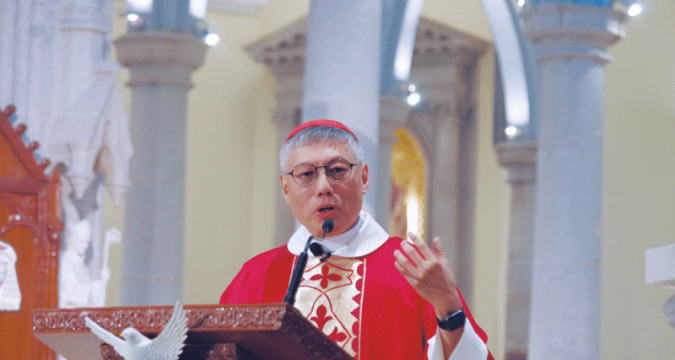Cardinal Stephen Chow, S.J., Bishop of Hong Kong, has highlighted the critical importance of fostering dialogue between the Catholic Church and China.
Speaking at a conference hosted by the Pontifical Gregorian University in Rome on Nov. 15, the prelate underscored the Church’s responsibility to engage with China in a manner that respects its rich cultural heritage.
Drawing inspiration from 16th-century Jesuit missionary Venerable Father Matteo Ricci, Cardinal Chow noted that Ricci’s approach exemplified how Christianity can be presented as harmonious with Chinese culture rather than as a foreign imposition.
“Ricci’s ability to present Christianity not as a foreign intrusion but as a teaching compatible with Chinese culture” was central to his success, the cardinal said in a report by Sunday Examiner, the official news site of the Diocese of Hong Kong.
China’s historical perspective has been deeply rooted in a Sino-centric worldview, with Confucianism forming the core of its cultural and social identity.
Cardinal Chow acknowledged this, saying, “The Jesuits, including Venerable Ricci, navigated this Sino-centric context by engaging with intellectual elites and demonstrating how Christianity could harmonise with Chinese cultural norms.”
However, historical tensions arose when elements of Christianity rejected ancestral worship, a cornerstone of Chinese tradition.
This clash led to the suppression of Catholicism during specific periods, reflecting the delicate balance required to integrate faith into China’s cultural framework.
The Church’s relationship with China shifted dramatically following the Communist Party’s rise to power in 1949.
Initially pragmatic, the government’s stance toward religion hardened as it sought to purge Western influences.
“As the People’s Republic of China consolidated power, a nationalist agenda emerged, aiming to purge Western influence,” Cardinal Chow explained. This agenda led to the expulsion of missionaries and internal divisions within the Church.
The Cultural Revolution (1966–1976) compounded these challenges, with the Catholic Church becoming a target of broader campaigns against traditional and foreign institutions. Religious practices were nearly eradicated during this period of upheaval.
By the 1980s, China’s reopening to the world marked a turning point in its approach to religion. The government adopted a more pragmatic stance, recognizing religion’s potential contributions to society.
This shift allowed the Catholic Church to expand its outreach through education, charitable work, and disaster relief.
“The Church seized this opportunity to witness its faith in various social spheres, contributing positively to Chinese society,” Cardinal Chow observed.
This period also saw increased intellectual engagement between Chinese scholars and international academics, fostering a more open attitude toward religion within policy-making circles.
“Just as Jesuits like Venerable Ricci once navigated the cultural and political complexities of Ming and Qing China, modern scholars and Church leaders can engage with Chinese authorities and intellectuals to foster mutual understanding,” Cardinal Chow said.
Under President Xi Jinping, China’s policy of “Sinicisation” aims to integrate Chinese cultural elements into all aspects of society, including religion.
While this poses challenges, Cardinal Stephen believes it also presents an opportunity for dialogue. “The Church’s mission is not about imposing its beliefs but about entering into meaningful conversations that respect and embrace cultural differences,” he emphasized.
Cardinal Chow’s remarks come at a time when dialogue between the Church and China is both urgent and necessary. He stressed that the Jesuit tradition of intellectual apostolate—engaging with policymakers and cultural elites through dialogue and education—remains crucial.
“Through empathy, dialogue, humility, and intellectual engagement, the Church can continue its mission in China, fostering understanding and witnessing the transformative power of faith in a rapidly changing world,” the cardinal said.






